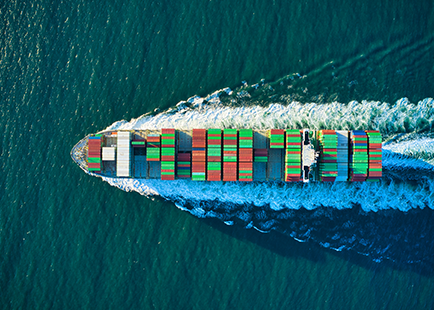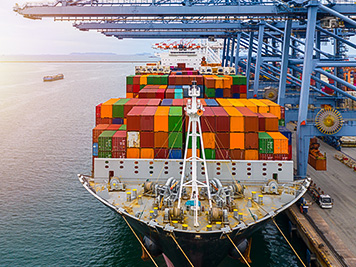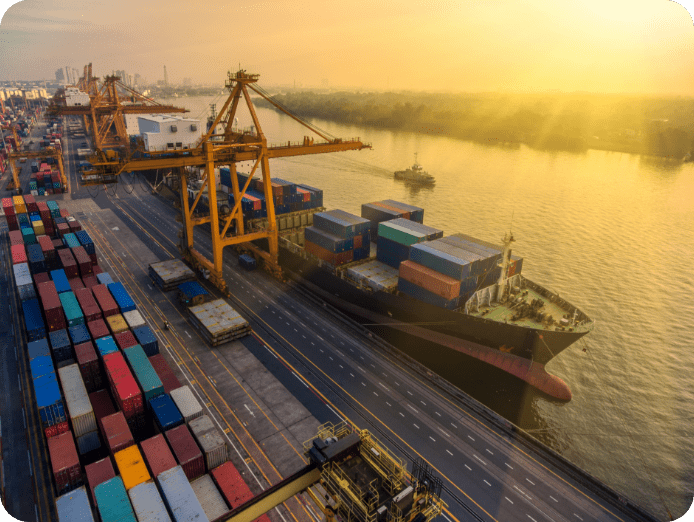
Cargo Shipping Insurance
International cargo shipping insurance is insurance cover that gives protection to shipments when they are in international border transit either by sea, air, or land. This places a limit on financial risks upon the event of loss and damages of cargo due to the sudden occurrence of accidents, theft, and calamities.
Key Features of International Cargo Shipping Insurance
1. Types of USA Coverage:
o All-Risk Coverage: This offers the widest USA coverage and, as such, covers almost all types of loss or damage to the cargo, except exclusion of specific ones.
o Named Perils Coverage: Reimburses losses from named risks, such as fire, sinking, or collision. It is less protective than an all-risk policy.
o Total Loss Coverage: compensation when USA cargo is completely lost or completely destroyed.
2. Common Risks Covered:
o Natural calamities: Hurricanes, storms, earthquakes.
o Theft and pilferage: Cargo theft during transit.
o Accidents: Collision, sinking if sea transport, or crash in case of air/land transport.
o General Average: It is a principle in maritime law whereby all cargo owners share the loss in case part of the cargo needs to be jettisoned to save the ship during some emergency.
3. Exclusions: Many events or conditions are generally not covered, including:
o War and terrorism-related losses
o Losses due to improper packing
o Delays
o Insurr(e) Inherent vice-natural deterioration or wear and tear
4. The benefits of cargo insurance are as follows:
o USA FINANCIAL PROTECTION- insurance replaces goods value in case of cargo damage or loss and pays to repair/replace the same goods.
o COMPLIANCE WITH GLOBAL TRADE-nearly all international trade contracts require proof of insurance
o PEACE OF MIND-the shipper and the consignee can operate the business with low risks because one is aware that goods are well covered during transit.
5. The type of goods that can be covered:
o Manufactured goods, raw materials, perishables, electronics, and machinery are commonly insured.
o Special USA policies are available for high-value goods, such as luxury items, pharmaceuticals, and live animals.

How to Get International Cargo Insurance
1. Assess Your Needs: Determine the value of your cargo and the potential risks based upon the shipping route and method of shipment by air, sea, or land.
2. Select Your International Policy Type: All-risk, named perils, or total loss-the choice depends on how much risk you are willing to bear.
3. Find a Reputable International Provider: Cargo insurance is sold by freight forwarders, shipping companies, and specialized insurers.
4. Read the Fine Print: Understand what the policy excludes, the process to claim, and precisely what it covers.
5. USA Documentation of your International shipment: Have proper documents of shipment value, contents of shipment, and the condition before shipment in case claims need to be filed at a future date.
Insurance for International cargo shipping is quite crucial to any business that deals with international trade. You lower the financial risks and ensure your supply chain flows well as a result of your goods being safeguarded against any damage or loss incurred in transit. Always tailor the insurance policy to match the value and nature of your cargo, as well as the specific risks associated with your shipping route.
Benefits of International Cargo Shipping Insurance
1. International Financial Protection:
o International cargo shipping insurance provides financial security as the prime benefit: in case the cargo is lost, pilfered, or damaged while in transit, the insurer would compensate the sender for the value of the goods. This reduces the impact on businesses to minimum losses.
2. Mitigation of Risk:
o International cargo shipment is highly prone to accidents and mismanaged situations, theft, and even natural calamities. International Cargo insurance safeguards against such risks, ensuring that even in the worst scenario, there is no total loss to the business.
3. Compliance with Global Trade:
o There are several international USA trade agreements and contracts which require proof of insurance. Adequate shipping insurance covering most eventualities assists a business in complying with such trade regulations with minimal chances of International legal or contractual disputes arising out of this.
4. Protection Against Contingencies:
o International transport often involves several means of transportation and passes through different territories, which makes the occurrence of unexpected incidents most likely. Cargo insurance covers against unexpected situations such as collision of ships, piracy problem, or customs issues.
5. General Average Cover:
oUnder maritime law, in the event of cargo being jettisoned or destroyed for the purpose of saving a vessel, all cargo owners will share the cost of lost cargo; what is referred to here as "General Average." Cargo insurance covers such losses and negates the need for the shipper to pay out of pocket.
6 Increased Business Confidence:
o Knowing goods are insured allows International businesses to confidently trade in the international USA markets. It allows companies to broaden their reach without having to constantly have anxiety over the losses that may occur in transit.
7. Competitive Advantage:
o Offerings of businesses offering insured shipping options have provided peace of mind, thus attracting a competitive advantage from the clients. The clients will often feel confident enough to invest with companies that insure their goods.
8. Claims Efficiency
o Many insurance companies give quick and effective claims, which means an organization can claim losses with minor delays, hence able to continue business.9.
9. Customization to Particular Needs:
o USA International insurance policies for cargo can be adjusted according to particular requirements for either the shipper or nature of the goods being transported. Whether it is high-value electronic gadgets, perishable items, or hazardous material, there are customized options to provide adequate protection.

10.Protection Across Multiple Transport Modes:
o International shipment may involve sea, air, rail, or road. Cargo insurance covers the goods in each stage of transportation, from the start to the end of shipment.
Conclusion: International cargo shipping insurance presents a business with financial and operational protection. Thus it allows companies to operate with a lot of security and more confidence through the various complexities and risks global trade may come up with.
Disadvantages of International Cargo Shipping Insurance
While international cargo shipping insurance International USA offers a great number of benefits, there are also a limited number of drawbacks, including the following:
Added Costs:
international cargo insurance is added on top of the final cost of shipment and thus raises the expenses associated with shipping. These might, in turn, be factored into the price at which the items are sold to generate a profit.
Exclusions and Limitations:
o Exclusions or specific situations: Improper packaging, war, terrorism, and inherent vice are some common things not typically covered under many cargo insurance policies. In this regard, even when an event takes place outside of the policy coverage, shippers may find themselves having to incur a financial loss.
The complication in the claim process is
o International insurance, though may be used for financial coverage, where the claims procedure could be long and hectic. In order to claim compensation shippers need to provide detailed documentation, proof of loss and evidence of proper packaging, all of which delay things.
Deductibles:
most insurance policies require the insured party to pay a deductible-an upfront cost-prior to the insurance coverage taking effect. For small or moderate losses, the amount of deductible may be greater than the value of the loss, therefore less practical to file against. 
Actual Chance of Underinsurance :
The incorrect or underestimated declaration of International cargo value; in case of loss or damage, a firm is compensated with an amount that is often lower than the actual value of the shipment. This is hard to avoid as there are complex and large shipments and fluctuating market values.
Underestimation of Risk:
Depending on where it is being International shipped to and how the consignment travels, there is likely to be overestimation of risks by a International business and paying too much premium than necessary for cover it needn't have. On the flip side of things, buying less insurance cover than the risk faced would mean under-insurance for risky shipping routes.
Non-availability of Flexibility to Small Businesses:
To smaller companies, particularly those shipping merchandise only occasionally or low value items the cost/benefit ratio may not be very encouraging. The weight of spending on the International insurance of small cargo may outweigh the financial gain likely to be achieved, especially from low-margin items.
International Variable Premiums:
International Insurance rates depending on the value of cargo, route, mode of transport utilized, and political or environmental conditions prevailing in the country of destination may be variable. Incurrence may make cost variable and predictions by business pretty difficult.
Dependency on Insurance:
The presence of insurance might make a few enterprises become laid-back and rely on insurance rather than show more concern about the controls that may be in place for packaging, selecting the right carrier, or monitoring shipment. This can lead to unnecessary claims and operational inefficiency.
Delays receive Limited Compensation:
ot Brend During Insurance- Not all cargo insurance covers the delays in transit. In most cases, delays that do not lead to some form of financial loss with respect to cargo damage are usually not compensated for, as in cases where there is damage to perishable items that spoil.
Policy of International Cargo Shipping Insurance
The policy of international cargo shipping insurance includes terms and conditions whereby the underwriter agrees to accept upon himself risk associated with the insurance of goods during their transport. Each policy is designed to cover very specific risks, losses, or damages occurring during the transit of cargo across international borders by sea, air, or land. Below are key elements and considerations within a typical international cargo shipping insurance policy:

Key Elements of Marine Cargo Insurance Policy
Scope Of Cover:
The International policy provides the type of risk covered, geographical areas where the cover is applicable, and modes of transport that include sea, air, and land. Most of the policies cover loss, damage, theft, or any form of destruction of goods while transportation.
International Types Of Cover:
All-Risk Cover: It is the widest form of cover, which covers all the risks except those that are specifically excluded.
Nama-named Perils International US.Coverage: named perils covered include those specifically identified in the policy. The most common perils are fire, sinking, or theft.
Total Loss Coverage: it pays to the insured an amount in case of loss of the whole shipment. Mostly, it's used for very highly valued and highly risk goods.
International Policy Period/Delivery Terms:
o. The policy states when the cover commences and when it terminates, usually from the moment of departure of the goods from the originating station to the time they arrive at their destination, including any storage, trans-shipment, or time spent in customs, depending on the terms of the policy.
Insured Value:
At the time of taking the insurance US.policy, the insured is supposed to declare the value of the cargo. The value declared by the insured becomes the maximum amount the insurer will pay out in case of loss or damage. This includes the cost of goods, shipping charges, and also the expected profit, usually declared in percentage terms, such as 10% of the value of the goods.
Deductibles:
The deductible is the amount payable by the insured before the insurance can avail. The quantum of deductible and whether it applies for partial loss or total loss is generally termed in the policy.
Exclusions :
The International U.S policy would specify exclusions or circumstances wherein the insurance will not cover, including
Poor packaging of goods
War, terrorism, political uprising-related losses
Inherent vice damage resulting from the nature of the goods, such as spoilage or wear and tear
Delay in delivery, unless it leads directly to cargo damage, for example
General Average Clause:
Under General Average, which normally applies to marine shipment only, if a portion of cargo has to be jettisoned to save the vessel, the resulting loss must be shared by all the cargo owners. The policy pays the share which falls on the Insured.
Claims Procedure:
But the International policy describes how a claim can be filed in case losses or damages are sustained. The insurance requires the assured to submit documents like a bill of lading, certificate of insurance, packing lists and a damage report. The period within which claims should be filed and settled is also specified
International U.S Policy Period:
International cargo shipping insurance policies may be issued as:
Single-Trip Coverage: It covers a specific shipment.
Annual International Policy: It covers all shipments made within a certain period usually one year. It is advantageous in the case of a firm which exports or imports merchandise at regular intervals.
Subrogation Clause:
Subrogation clause, after paying the loss to the insured, provides the right to the insurance company to recover from a third party liable for loss or damage, which may include a carrier or a handling agent
Calculation Of Premium:
The premium, or cost of the International U.S policy is usually determined by:
The value of the goods
The type of coverage chosen, all-risk or named perils
The route and destination, knowing that more 'risky' routes or political turbulent areas may be charged at higher International US.premiums
The mode of transport, sea, air, or land
The type and nature of the goods being shipped, where high-risk items to be transported, such as perishables or International electronics, may be more costly to insure.
International War and Strikes Clause:
Some International USA policies have a War and Strikes Clause, which provides insurance for losses arising from war, strikes, or civil commotions. This is an option as an additional protection or security.
Steps Involved in Policy
1. Submission of Proposal: A proposal is made to the insurer regarding the cargo he is about to ship, the means of shipment, and the route to be adopted.
2. Selection of Risk: The commodity, route, vessel, etc are considered by the insurance company before accepting the risk.
3. International Policy Issuance: After the terms are agreed upon, coverage details, exclusions, and premium, the policy is issued.
4. Protection of Shipment: The USA cargo is protected with the policy until it reaches its destination.
5. Filing of Claims: In case there is any loss or damage, the insured files a claim with proper International documentation.
Posted on 2024/10/14 09:29 AM
